Ellen Gable's Blog, page 109
March 25, 2012
Sunday Snippets – March 25
Join me and other Catholic bloggers at RAnn's Place for Sunday Snippets where we share posts from the previous week.
Here are my posts:
After Miscarriage: A Catholic Woman's Companion to Healing and Hope I contributed a story to this book on miscarriage by Karen Edmisten.
Lenten Pretzels My son and I made a batch of soft pretzels. They were delicious and were devoured by family members almost as soon as they came out of the oven.
7 Quick Takes Friday – The Contents of My Mother's Special Box A poignant 7 Quick Takes about my late mother's special box I found in the attic.
FREEBIE ALERT: My third novel, Stealing Jenny, will be available FREE on Amazon Kindle tomorrow and Tuesday.
Copyright 2012 Ellen Gable Hrkach








March 23, 2012
7 Quick Takes Friday – The Contents of My Mother's Special Box
 Please join me and other Catholic bloggers at Conversion Diary for 7 Quick Takes Friday.
Please join me and other Catholic bloggers at Conversion Diary for 7 Quick Takes Friday.
FREEBIE ALERT! Before I get to my post today, I want to let readers know that my first novel, Emily's Hope, is available FREE today and tomorrow on Kindle at the following link: Emily's Hope Kindle Edition. My third novel, Stealing Jenny, will be available free this Monday and Tuesday, March 26th and 27th.
My 7 Quick Takes Friday post today is entitled "The Contents of My Mother's Special Box."
Last Friday, my two youngest sons and I spent the entire day driving from my hometown in New Jersey to our home here in Pakenham, Ontario. It usually takes anywhere from 9.5 to 12 hours, depending on traffic, how many stops we make and weather. We started the day with early Mass, a quick breakfast, then began our journey.
The previous six days had been a difficult, heart-wrenching time of sorting through my mom's possessions. She passed away nearly five years ago, but since my stepdad and sister were still living in the house, there was no rush to go through her things.
Now that my stepdad is gone and my sister is a religious sister, my childhood home will likely be sold, so I made a special trip down to NJ to assist my siblings in going through her belongings.
When my siblings and I were children, my mother kept a flowered, maroon-colored box in her dresser drawer where she stored the special mementos of her life before and just after marriage. I couldn't find it in the days after her death, so I asked my youngest sister and stepdad if they knew where it was. They both replied that they had no idea where it had gone.
Before I traveled down to NJ, I made a mental note to look for that box and, most importantly, to ask St. Anthony to help me find it. When I arrived at the house, I decided to search in the attic and through the many boxes of Christmas decorations my mom had bought and collected over the years. When I opened the second box, I gasped. Sitting at the top was my mom's special box. "Wow," I muttered. Then I said, "Thank you, St. Anthony." 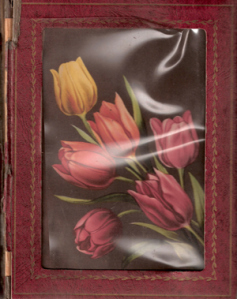
Here are seven of the items I found:
1. Wedding Night Receipt and Wedding Invitation. My mother was married to my father for 23 years before he died in 1978. I already had a copy of the wedding invitation, but I was thrilled to find the wedding night receipt.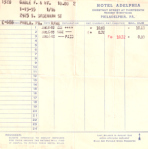
2. Graduation Stole Mom was the first of her siblings to graduate high school. She was a proud graduate of Hallahan High School (Class of '51).
3. A Booklet entitled "Senior Class Memories." Inside this book were cards with classmates' names and a page at the back for "Prom."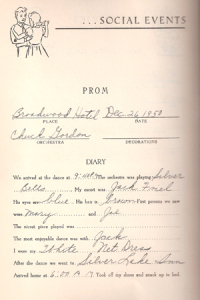
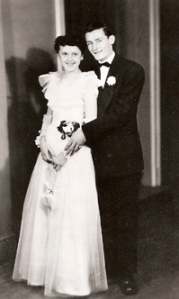
4. Large Miraculous Medal Although I'm not certain, I think she received this either for her 8th Grade Graduation or her graduation from high school.
5. First Bank Book Before and just after she was married, my mom regularly deposited $10.00 per week (a lot of money in 1954).
6. Corsage and head piece from her graduation from St. Richard's School in Philadelphia. (My mom is in the front row, center, with the corsage). 
7. Finally, there was a small booklet entitled "To the Graduate," that Hallahan HS gave to all graduates. At the front of the book, a message to the graduates. The very last page has a prayer called "Our Lady's Blessing" that I'd like to share:
May the Light of the Countenance
of my Little Child
ever shine on you.
May the perfection of His actions
be seen in all your works,
that nothing may be found
at the last day
but that for which you may be
rewarded.
May His Sacred Heart
be your Refuge
when beset with temptation and
tried by affliction.
May you enter the Divine Heart of
Jesus through the pierced heart
of your Queen and your Mother.
May your last hour be
your best hour and
May the Names of Jesus and Mary
seal your lips till we meet in Eternity.
Amen.
I miss my mother every day and I'm so grateful to have found her special box.
For more Quick Takes, visit Conversion Diary.
Copyright 2012 Ellen Gable Hrkach








March 22, 2012
Lenten Pretzels
 I am originally from New Jersey, so Philadelphia soft pretzels were a common snack both at home and at school when I was growing up. Soft pretzels, however, are a rare commodity up here in Canada.
I am originally from New Jersey, so Philadelphia soft pretzels were a common snack both at home and at school when I was growing up. Soft pretzels, however, are a rare commodity up here in Canada.
After reading about the history of pretzels in Kathleen Basi's book, Bring Lent to Life, I decided to make this a Lenten project. Yesterday, my son and I spent the afternoon making soft pretzels. Twisting the dough just right was a bit of a challenge, but we were both pleased with how our first batch of pretzels turned out. They not only looked pretty good, they also tasted great!
According to some sources, the shape of pretzels was meant to illustrate arms crossed in prayer.
Years ago, during Lent, the faithful were called to abstain from meat, eggs, milk and butter. Pretzels were an ideal food to eat because it was free of these ingredients. We used a recipe similar to this recipe, except we did not use butter.
This link has more information about the history of the pretzel.
Text copyright 2012 Ellen Gable Hrkach
Photo copyright 2012 James Hrkach








March 20, 2012
Emily's Hope FREE this Friday and Saturday
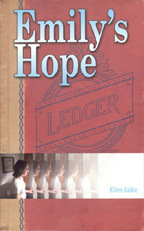 The Kindle edition of my first book, Emily's Hope, will be FREE this Friday, March 23rd and Saturday, March 24th.
The Kindle edition of my first book, Emily's Hope, will be FREE this Friday, March 23rd and Saturday, March 24th.
Some people have coined my book "NFP Fiction." It's based on the true stories of myself and my great-grandmother. Here are a few of the reviews I've received since my first book was published seven years ago:
"Compelling…a real page turner."
Damon Owens, Host of EWTN's "NFP: Embracing the Marital Gift"
"Your book is a vehicle for the whole truth behind the Theology of the Body, presented so that people can see how the teachings of the Church are to be followed."
Joan Hon, author, "A Trip to Medjugorje"
"There is so much to love about Emily's Hope — the innocence of young love, the beautiful, miraculous, healing power of love and the beauty of sacrificial married love and its life-giving splendor. This story is not a fantasy, but is a tender and sensitive portrayal of what makes love real and lasting."
Jean Heimann, Catholic Fire
"This book is a must read for anyone who has ever questioned whether living the NFP lifestyle is worth it or ever been resentful of the deprivations of NFP. I loved this book!"
Christopher Blunt, author, "Passport"
"I would encourage everyone to read this book, certainly young women. It is a book I can wholeheartedly recommend."
David Beresford, Catholic Insight Magazine
"While this book is definitely about NFP, it is also about the love of husbands and wives, the love of parents for their children and the agonizing moral choices we sometimes face. It is also about real people…and about being witnesses to a culture of life in a world overshadowed by a culture of death."
Kristie Wellman, One More Soul
To read more reviews, click here: Emily's Hope Kindle Edition.
Emily's Hope will be available for FREE this Friday, March 23rd and Saturday, March 24th!








March 19, 2012
After Miscarriage: A Catholic Woman's Companion to Healing and Hope
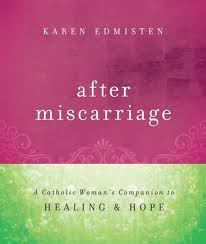 After Miscarriage: A Catholic Woman's Companion to Healing and Hope is a wonderful new book by Karen Edmisten, that shares the experiences of mothers and how they dealt with miscarriage and baby loss. I contributed a story called "Eternal Gifts."
After Miscarriage: A Catholic Woman's Companion to Healing and Hope is a wonderful new book by Karen Edmisten, that shares the experiences of mothers and how they dealt with miscarriage and baby loss. I contributed a story called "Eternal Gifts."
Years ago, after suffering two miscarriages in a row, I began writing in a journal to ease my grief. These journal entries eventually became my first published article, Five Little Souls in Heaven, and then also was the basis for my first novel, Emily`s Hope.
The author of this booklet, Karen Edmisten, also shares her own journal entries, as well as her story of losing five babies through miscarriage.
This is a deeply moving, beautiful collection of stories, poems and reflections.
Karen was recently on the Among Women Podcast with Pat Gohn to speak about her book and her experience with miscarriage. She talked about miscarriage sometimes being a private pain because the couple often hasn't yet told anyone of their news.
Last year, I also appeared on Among Women Podcast (Episode 89) and spoke about my experience with pregnancy loss.
For more Baby Loss Resources, please click on the link above my blog name "Baby Loss."
copyright 2012 Ellen Gable Hrkach

March 18, 2012
Sunday Snippets – March 18
 Please join me and other Catholic bloggers at RAnn's Place for Sunday Snippets, where we share posts from the previous week.
Please join me and other Catholic bloggers at RAnn's Place for Sunday Snippets, where we share posts from the previous week.
This has been a slow blogging week since I was away.
Here are my posts:
The Stigma of Self-Publishing My latest post for the Catholic Writers Guild Blog.
Review of Pro Luce Habere (To Have Before the Light) Volume II by Krisi Keley.

March 13, 2012
Pro Luce Habere (To Have Before the Light) Volume II by Krisi Keley
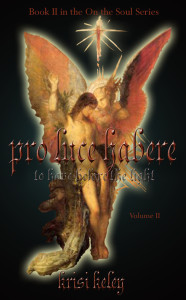 The second volume of Pro Luce Habere is an incredibly compelling read. Valery continues to be haunted by the darkness and death he has seen in the human world around him. Yet he is unable to escape the sense of wrong in what he's become so he seeks a new world (in North America), free of the Old World's pain. Valery continues in his struggle to understand the battle between light and darkness, both within his victims and within himself, as mystical dreams and repeating the mistakes of his maker lead him towards the truth eight hundred years of pain have tried to have him deny.
The second volume of Pro Luce Habere is an incredibly compelling read. Valery continues to be haunted by the darkness and death he has seen in the human world around him. Yet he is unable to escape the sense of wrong in what he's become so he seeks a new world (in North America), free of the Old World's pain. Valery continues in his struggle to understand the battle between light and darkness, both within his victims and within himself, as mystical dreams and repeating the mistakes of his maker lead him towards the truth eight hundred years of pain have tried to have him deny.
There is no denying that Krisi Keley is a gifted writer who can weave intricate story lines and create characters so real it's hard to believe they're fictional. I particularly love her character study of Valery. He is, after all, a vampire, but he is a vampire with a conscience and this shows in his interaction with other main characters.
I enjoyed advancing through time with Valery and his "child," Michel. The setting, language and historical accuracy are done extremely well and I could easily picture Valery and the other characters in the different time periods (I found it amusing to picture the two of them in 60′s garb…). Valery is definitely a character with contrasts. He kills others to stay alive, then at one point (during one of the World Wars) he reflects on the destruction and sometimes pointlessness of war.
As I've said in my reviews of Keley's other books, I don't normally read "vampire" or paranormal novels, but Keley's writing is so beautiful, I want to relish each word and sentence. I find myself easily empathizing with the main character, despite the fact that he is a vampire. He is and has continued to be an incredibly well-developed character. I especially appreciate the Catholic themes of free will, redemption and God's unconditional love.
Valery's loneliness and dependence on Michel for companionship leads to a chilling climax that had me turning pages quickly (or clicking the forward button on the Kindle).
I highly recommend this wonderful book (and the other two in the series) to anyone wanting to read a beautifully written story with a great cast of characters and Catholic themes.
Copyright 2012 Ellen Gable Hrkach








March 12, 2012
The Stigma of Self-Publishing
I'm over at the Catholic Writers Guild blog today discussing the "Stigma of Self-Publishing."
I am the self-published author of four books. Three of my books are currently on various bestsellers' lists on Kindle. My second novel,
Another time, I attended a large "book fair," where hundreds of authors set up tables and sold books. There were other self-published authors at this event. At first glance, however, it wasn't obvious that I was a self-published author. My books had professional looking covers and book trailers. I sat beside a published author who began conversing with a prospective reader. "Did you self-publish your book?" the reader asked. "Oh, no, I would never have done that. My books are published by a reputable publisher." She would never have stooped so low as to self-publish. Ouch.
Self-publishers have come a long way. Years ago, authors who took the "vanity" publishing route were rarely taken seriously and they rarely sold more than a few books.
That attitude has improved in the seven years since I published my first novel, although many professionals in the publishing industry and some traditionally-published authors continue to have a bias against self-published authors and books.
I believe part of the reason is because self-publishing is so easy nowadays that just about anybody can do it and the quality of some self-published books is poor. Some naive first-time authors think they can do it all. Some newbies think that they are great writers and don't "need" an editor. Novice authors often think they can design their own cover without any sort of advice from a visual designer. I have seen more than a few self-published books in my capacity as reviewer for Catholic Fiction.net in which the quality of writing was so bad I won't even review it.
Another reason there may be a negative bias toward self-publishing could be the belief that self-published authors wouldn't be able to get published by a traditional publisher or that perhaps they have already been rejected. This may be true for some self-published authors. But consider the case of self-published millionaire, Amanda Hocking who was rejected by traditional publishing houses and who is selling 100,000 books per month on Kindle.
On the one hand, I understand why some newspapers, magazines and websites need to have a blanket rule in place for self-published books (since there are many poorly written self-published books). On the other hand, I have also read extremely well-written novels by authors who self-published: Elena Maria Vidal, Gerard Webster, Christopher Blunt, Krisi Keley, Regina Doman, to name a few. 
Although self-publishers have come a long way, we have not arrived yet with regard to "stigma" of self publishing. Despite the stigma, I don't believe I would ever go the traditionally published route. After self-publishing four books (with lots of assistance) and after having 100 percent of the control, it would be hard to give my books to a publishing company. For me, it would be like giving my baby away to someone else to raise.
The stigma and negative bias of self-publishing will likely not disappear completely. However, if self-published authors continue to publish quality books, sell to thousands of readers and raise the bar for self-published books, it will hopefully lessen the stigma.
To learn more about self-publishing, I'll be giving two chat presentations at the Catholic Writers Conference Online in March: Self-Publishing and Kindle e-books.
Copyright 2012 Ellen Gable Hrkach Images purchased from iStock








March 10, 2012
Sunday Snippets – March 11
 Please join me and other Catholic bloggers at RAnn's Place for Sunday Snippets where we share posts from the previous week. For me, lots of book reviews:
Please join me and other Catholic bloggers at RAnn's Place for Sunday Snippets where we share posts from the previous week. For me, lots of book reviews:
Bring Lent to Life Book Review
A Garden of Visible Prayer Book Review
7 Quick Takes Friday- It's All in a Name
We Need to Get Smarter About Promoting NFP A great post by Kathleen Basi at the CCL Blog.
Copyright 2012 Ellen Gable Hrkach








We Need to Get Smarter About Promoting NFP!
 Excellent article by Kathleen Basi over at the CCL Blog. Here's a short excerpt:
Excellent article by Kathleen Basi over at the CCL Blog. Here's a short excerpt:
If there's one thing the ongoing controversy over contraceptive coverage can teach us, it is this: we have to be smarter about the way we advocate for NFP over contraception. In recent weeks, we've heard the argument that because Catholics use birth control just as much as everyone else (although that is an exaggerated claim), this whole controversy is much ado about nothing.
In one sense, the critics have a point: how can we expect to be taken seriously if we can't even convince our own members? We have to take the message to the secular world — and let's face it, our fellow Catholics — and we have to do it on their terms, not ours.
What do I mean by this?
I mean that we can list side effects till we're blue in the face, but every medication has side effects, and hardly anyone experiences them. If they do, they consider the benefit to outweigh the side effect. Trying to argue people out of contraception on that basis is doomed to fail.
To read the rest of this article, click here.











